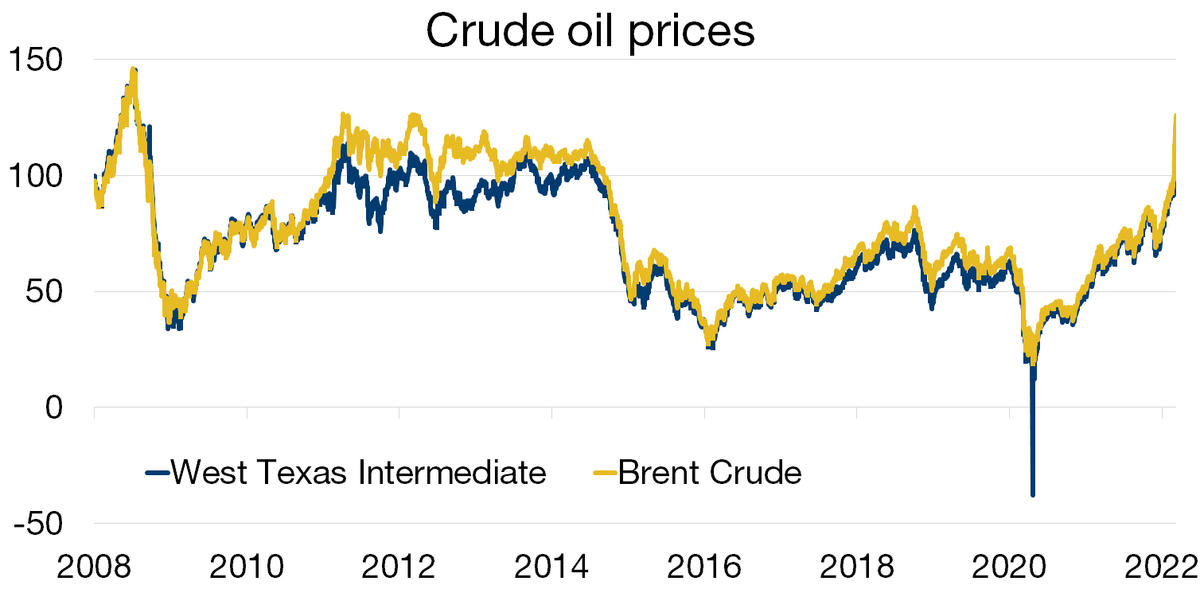
Are you interested in economic and financial news?
Bank Bonhôte is pleased to welcome you and puts at your disposal its finance experts.


| USD/CHF | EUR/CHF | SMI | EURO STOXX 50 | DAX 30 | CAC 40 | FTSE 100 | S&P 500 | NASDAQ | NIKKEI | MSCI Emerging Markets | |
| Latest | 0.92 | 1.00 | 11'300.13 | 3'556.01 | 13'094.54 | 6'061.66 | 6'987.14 | 4'328.87 | 13'313.44 | 25'985.47 | 1'144.91 |
| Trend | |||||||||||
| YTD | 0.52% | -3.36% | -12.24% | -17.27% | -17.57% | -15.26% | -5.38% | -9.18% | -14.90% | -9.75% | -7.07% |
(values from the Friday preceding publication)
Historically, geopolitical events have had a short-lived impact on financial markets. But this time round the pandemic had already limited production for companies and gummed up supply chains, leading to surging inflation.
Russian forces have continued invading Ukraine, leading to a further deterioration in financial conditions, which could in turn dampen consumer spending and global economic growth. In recent years, Europe increased the share of imports in its energy consumption to 60%. And it relies heavily on Russia, especially for gas, which accounts for one-third of its demand.
Last week was a real shocker for equity markets, hit by sharp corrections on benchmark indices and an upswing in volatility. Banking stocks were slapped hardest, suffering from fears of repercussions from several Russian banks entering into insolvency following the sanctions on international payments. The automotive sector was also shunned by investors as it could be hurt by the shutdown of production units, the shortage of spare parts from Ukraine and Russia, and the increase in commodity prices.
This week has got off to a very bad start, with asset prices reacting to rumours that the US and its European allies have agreed to a total ban on oil imports from Russia to round out their existing economic sanctions. Investors have piled into safe havens like gold, the Swiss franc and the dollar. Prices of Brent crude and key commodities are soaring again, although traders, shipowners, banks and insurers have already largely stopped buying from Russia, given the risks involved.
One might also wonder if the current oil shock and the geopolitical haze could coax the Fed into changing its monetary policy plans. In his half-yearly testimony before Congress last week, Chair Powell noted that the current conflict makes the situation more uncertain and complicated, but that fighting inflation remains a priority at the Fed. He estimated that the interest rate hike at the next FOMC meeting in mid-March could amount to a quarter-point. Given that the US job market is doing well, with new positions created still well above expectations in February, a half-point increase might be in the pipeline for later.
Since Russian oil has become undesirable, crude prices have rocketed to levels not seen since 2008. Brent crude hit USD 139 in early trading today after US Secretary of State Antony Blinken announced that the US and its allies were discussing a possible embargo on crude supplies out of Russia.
If decided, that would spell a further escalation of sanctions against Russia by the West, whose economy remains nevertheless heavily dependent on Russian oil and gas exports. Traders and refineries have been forced to sell their stock of Russian oil at deep discounts and are now boycotting it. Until the final contours of international sanctions against Russia are defined, stakeholders do not want to touch Russian oil. Shell, Equinor BP and Exxon have announced that they will cut all ties with Rosneft and Gazprom. Only TotalEnergie has not yet publicly announced that it will burn its bridges with Russia.
This loss of Russian supply deprives the oil market – already strained by the increase in post-pandemic consumption – of 5 million barrels per day. The US and other International Energy Agency member countries have announced the release of more than 60 million barrels of oil from strategic stockpiles in an effort to dampen prices and prevent supply shortages. Negotiations with Iran on a nuclear agreement, which if successful would lift sanctions on Iranian crude oil exports, are in progress but parties are still struggling to see eye to eye.
OPEC+ members have not yet changed their policy of gradually increasing production and believe that the current volatility is due to geopolitical factors, not fundamentals. Analysts believe that the price of Brent could rise to USD 200 if tensions in Ukraine worsen and OPEC does not increase its supply sooner.

Download the Flash boursier (pdf)
This document is provided for your information only. It has been compiledfrom information collected from sources believed to be reliable and up to date, with no warranty as to its accuracy or completeness.By their very nature, markets and financial products are subject to the risk of substantial losses which may be incompatible with your risk tolerance.Any past performance that may be reflected in this documentis not a reliable indicator of future results.Nothing contained in this document should be construed as professional or investment advice. This document is not an offer to you to sell or a solicitation of an offer to buy any securities or any other financial product of any nature, and the Bank assumes no liability whatsoever in respect of this document.The Bank reserves the right, where necessary, to depart from the opinions expressed in this document, particularly in connection with the management of its clients’ mandates and the management of certain collective investments.The Bank is a Swiss bank subject to regulation and supervision by the Swiss Financial Market Supervisory Authority (FINMA).It is not authorised or supervised by any foreign regulator.Consequently, the publication of this document outside Switzerland, and the sale of certain products to investors resident or domiciled outside Switzerland may be subject to restrictions or prohibitions under foreign law.It is your responsibility to seek information regarding your status in this respect and to comply with all applicable laws and regulations.We strongly advise you to seek independentlegal and financial advice from qualified professional advisers before taking any decision based on the contents of this publication.